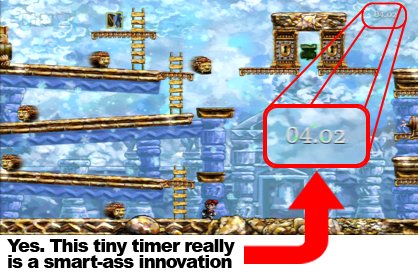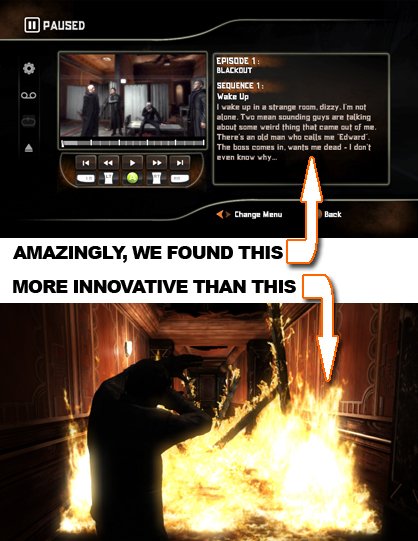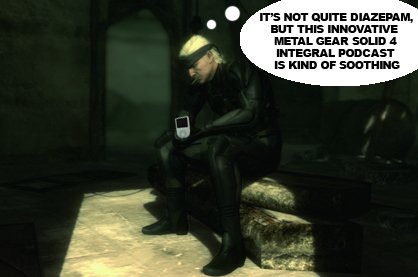Amazing game innovations you never even noticed
Sometimes the smallest things make all the difference
Fable II is all sorts ofincredible. There's plenty to astound and amaze, but there's one easy-to-overlook feature that has really impressed us. The dog. He's loveable, he's faithful and, if you treat him right, he's useful too. But if Peter Molyneux hadn't done such a fine jobhighlighting the brillianceof Fable II's pooch, would we even have noticed?
And that got us thinking. What other features haven’t been praised enough or were hastily glanced over in favour of more obvious innovations? And so, in the spirit of Peter and his wonder dog, here are a fine selection of recent features that haven't been given the credit they deserve.
Game: Braid
Innovation: The timer
Braid is an outstanding world. Well, seven outstanding worlds to be precise. The puzzles, the art and the music are all exceptional pieces of work, and have been recognised as such. It's not what impressed us most, however. Instead, our eyes were drawn to a seemingly inconsequential feature which highlights the work involved in undertaking a project such as Braid: a timer.

Let's explain. In its simplest form, Braid's all about rewinding time - and hence your actions - to solve puzzles. In-game items which sparkle green obey a different set of rules, and aren't affected by your time manipulation skills.
Absolutely everything in Braid's worlds adheres to this law. That the speedrun timer - a feature which many gamers won't ever see and an 'item' which has every reason to be classed as a separate entity from the rest of the game - also stays true to Braid's rules is a breathtakingly anal detail most developers wouldn't even consider, and it's a degree of robustness other games should strive to emulate.
Game: Alone In The Dark
Innovation: DVD Menu
So Alone In The Dark had its fair share of problems. So much so, in fact, that in the end Eden's masterpiece came precariously close to becoming a disasterpiece. But tucked away in AITD was one of the year's most exciting features - and no, we're not talking about the messy inventory system or the propagating fire. It was, of course, the level select menu which allowed you to play the game as you wanted - even to the extent of skipping entire chapters.

Truth time: it made our job of going back through the game to take pictures for reviews and guides much bloody easier than usual, but that's only the start of it. For most people it's a feature that rarely came into play; after all there's little point in skipping ahead and missing chunks of the game you've paid to play.
Sign up to the GamesRadar+ Newsletter
Weekly digests, tales from the communities you love, and more
What the DVD-style menu should be praised for is its charity. It allowed those who were stuck - either due to their own inadequacies or one of the game's many - to jump ahead and cut out plenty of frustration. It even gave people a chance to replay favourite sections without revisiting other areas or even needing a library of different save files to load from, and it was a Godsend for people wanting to mop up missing Achievements with the greatest of ease. Games aren't cheap, so the ability to play them on our terms is one that's always welcome.
Game: Metal Gear Solid 4
Innovation: Podcast
The Metal Gear Solid series is no stranger to breaking down the fourth wall, but it took things to a new level with Metal Gear Solid 4. The in-game podcast is the ultimate acceptance of the game's medium, especially as Snake himself will grow less tense just by listening to it.

We've seen similar things before, albeit in the guise of developer walk-throughs. Both Half-Life 2 and Portal feature developer commentaries, and the extra features keep on piling up. Konami has taken the idea to the extreme with the integral podcast, which is reality within an alternative reality, but if EA go ahead with plans to cram Blu-ray discs with extra game media when there's space available it won't be long before they come up with even more outlandish ideas to push the boundaries.



